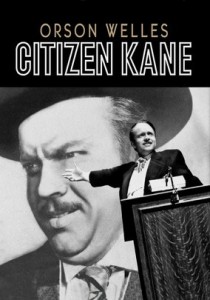Citizen Kane-1941
Director Orson Welles
Starring Orson Welles
Top 100 Films #19
Scott’s Review #296
Reviewed December 12, 2015
Grade: A
Regarded as one of the greatest films ever made, Citizen Kane (1941) is a technically brilliant film that introduces fantastic new elements into film never before seen and replicated for decades. It is a timeless masterpiece still enjoyed and marveled at in modern times.
Forget what the story is about, as one can sit back, not having any idea of what the story means (it can be a bit difficult to follow), and look at the film from a cinematic perspective.
The various camera angles, shadows, and use of an actual ceiling (never seen in film before) are impossible not to appreciate for any film lover.
My favorite scenes occur when director (and star) Orson Welles uses snow falling outside as the cameras look through a window to observe the winter wonderland. This quality is simply astonishing in creative technicality.
I can view this scene over and over again.
The plot is a hybrid of drama and mystery. The life and legacy of newspaper legend Charles Foster Kane are examined.
The character, played by Welles himself, is loosely based on a real-life figure, William Randolph Hearst.
The film is told mainly through narrated flashbacks, as a newsreel reporter attempts to solve the big mystery centered around the deceased celebrity- his dying word, uttered from his lavish Florida mansion, was “rosebud” and nobody seems to know who “rosebud” is or what the word represents.
As the story goes along we learn more about the famous Kane. Jerry Thompson, the reporter, learns that Kane’s childhood in Colorado was one of poverty.
His mother, discovering a gold mine on her property, sent Kane away to be educated by a famous banker, thus securing his future. Thompson also interviews Kane’s business manager and Kane’s ex-wife, now a drunk who owns a nightclub, but neither can shed light on the mystery.
The mystery- never solved by Thompson nor anyone else- is revealed at the end of the film, to the viewer only, in fantastic form and Kane’s childhood is key to the entire puzzle. This angle is creative and imaginative and brilliant for the entire film.
Technically, one of the best, most creative film creations, Citizen Kane has lost none of its marvels over the years and can be watched, studied, and introduced to new generations of film lovers eager to learn what a true movie gem is all about.
Oscar Nominations: 1 win-Outstanding Motion Picture, Best Director-Orson Welles, Best Actor-Orson Welles, Best Original Screenplay (won), Best Scoring of a Dramatic Picture, Best Sound Recording, Best Art Direction-Interior Decoration, Black-and-White, Best Cinematography, Black-and-White, Best Film Editing
